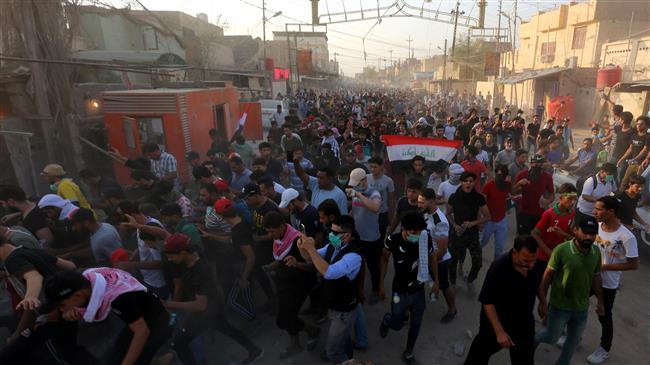
RNA - "We have complete information and documents that show the US embassy and consulate in the country caused the Basra unrest," Abu Mahdi al-Muhandis, the second-in-command of the volunteer anti-terror fighters, said on Sunday.
Basra has been rocked by deadly protests since Tuesday. The protests took an ugly turn on Friday when a group of masked assailants raided government buildings and offices of political parties and set them ablaze. The Iranian consulate was among the premises gutted in the rampage.
Muhandis held Washington responsible for the Basra unrest, saying it was actually meant to sow discord among different Iraqi political parties and movements.
He also vowed to respond to the Basra incidents and stressed that the Iraqis would never engage in another civil war.
President Fuad Masum condemned the attacks on buildings, including the Iranian consulate, and called for an immediate investigation into the raids.
In a statement released on Saturday, he said "some extremists" had hijacked the protests to attack Iraqi and foreign buildings.
Masum underlined the need for boosting "brotherly relations" with Iran, which was famously the first country to rush to Iraq's help in 2014 when Daesh terrorists reached the gates of Baghdad.
Protesters in Basra are angry about endemic corruption, collapsing infrastructure, poor public services, high rates of poverty, soaring unemployment, and contamination of potable water.
At least 15 protesters have died in clashes with security forces since the beginning of the month, health officials have said.
Security forces were deployed to patrol the streets of Basra before officials eventually lifted a curfew that was imposed in the wake of the protests.
Basra, once known as the "Venice of the East” because of its freshwater canals, has been hit by an acute water crisis and crippling electricity shortages this summer amid surging temperatures.
Adding to the outrage is a water pollution crisis and salt water seeping into tap water that is making residents sick.
The water is reportedly so polluted it cannot even be used for cooking or washing. The protests began in June, tapered off, but then restarted Monday following a surge in water poisoning cases.
On Saturday, the two leading groups in the parliament called on Prime Minister Haider al-Abadi to step down.
Muqtada al-Sadr 's Sairoon (Marching Towards Reform) bloc, and the Fatah (Conquest) alliance led by secretary general of Badr Organization Hadi al-Ameri lashed out at the Iraqi premier over the Basra chaos.
"We demand the government apologize to the people and resign immediately," said Sairoon spokesman Hassan al-Aqouli.
According to Press TV, Fatah spokesman Ahmed al-Assadi also condemned "the government's failure to resolve the crisis in Basra."
He said Fatah was "on the same wavelength" as Sairoon and that the pair would work together to form a new government.
'Saudi intel agency complicit in Basra violence'
With new details emerging from the Friday mayhem, Iraq's Alahad television network said it had obtained audio recordings that revealed the Saudi intelligence agency's role in the Basra incidents.
The agency, the report said, has employed people in Iraq to use them in critical times and monitor the situation in the Arab country.
According to the broadcaster, informants reported to Saudi officer Abu Khalid al-Saudi who sought the arrival and departure of Iraqi army commanders and police officers.
Alahad said it had obtained a phone conversation of the the Saudi officer who was asking one of the informants to take photos and videos from Iraqi security forces.
In another phone call, the Saudi officer was asking the informant to gather information on Hashd al-Sha’abi centers in Basra. The allegations cannot be independently verified.
The provincial office of Hashd al-Sha’abi was among the buildings torched in the Friday attack.
847/940